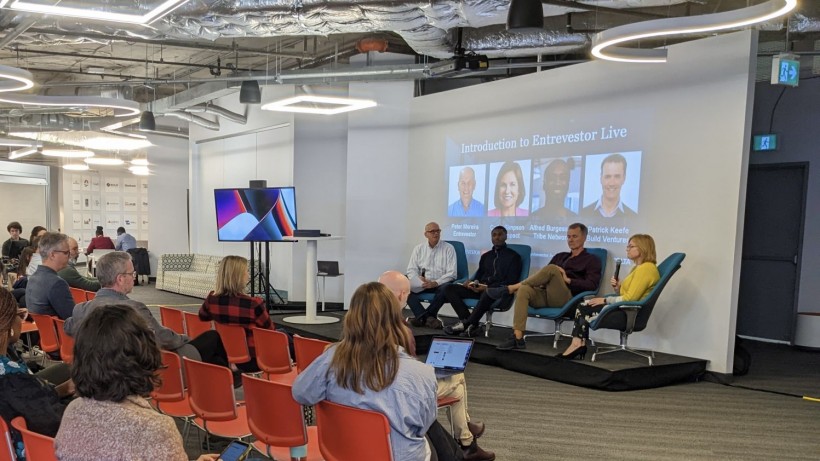Entrepreneurs and investors gathered at Halifax startup hub Volta Thursday for the second annual Entrevestor Live conference, which was held in-person for the first time.
The three-hour event gave startup founders like Shoelace Learning CEO Julia Rivard Dexter and Milk Moovement Co-founder Robert Forsythe, along with investors like Sandpiper Ventures Founding and Managing Partner Rhiannon Davies and Build Ventures General Partner Patrick Keefe, the chance to weigh in on the East Coast startup community.
Dexter exited from part of her educational technology company last year via a sale to Bellevue, Wash.-based DreamBox and Forsythe’s team is fresh off a US$20 million capital raise.
Here are some of the highlights:
How to Improve BIPOC Inclusion
“Not seeing people like you in a space makes it hard to feel like you belong.” That was Tribe Network CEO Alfred Burgesson’s succinct description of why Atlantic Canada has struggled to increase BIPOC representation in its startup community.
While the region is making progress on diversity, equity and Inclusion for some groups, particularly immigrants, who comprise almost a fifth of startup founders, BIPOC entrepreneurs continue to be badly underrepresented.
Entrevestor’s 2021 Atlantic Canadian Startup Data Report found that just 1.2 percent of companies were led by principals who identified as Black, with just two new Black-led businesses being created that year. Indigenous founders were only marginally better represented at 1.6 percent of the overall community, and just one new Indigenous-led company was created that year.
Burgesson, whose organization provides support services for BIPOC founders, said that while programs offering skills training to minority groups are a step in the right direction, the key change that needs to be made for Black founders to feel more welcome is to see themselves represented in the staffs of existing support organizations and companies.
“We have a platform, we have programs … but there need to be people in the space who can relate to them and support them,” said Burgesson.
Then, once founders have made it through Atlantic Canada’s deep roster of pitch competitions, accelerators and incubators, there will also need to be a sufficiently robust funding ecosystem to continue supporting them: “If we manage to steer Black Entrepreneurs into high-growth industries … we’re going to need a pipeline for follow-on investments.”
For Funding, It Can Pay to Look Far Afield
While onboarding an investor from outside the region was once a rare achievement for an Atlantic Canadian entrepreneur, it has now become commonplace, partly because American venture capital firms tend to buy in at much higher valuations than their Canadian counterparts.
Forsythe, Milk Moovement’s CEO, recalled trying unsuccessfully to raise a round of seed funding in Canada before turning to American investors and closing a larger US$3.1 million round last year. The gangbusters US$20 million raise his supply chain software company announced this summer was also mostly from American backers.
And when the New Brunswick Innovation Foundation bought into Fredericton cybersecurity startup Sonrai Security’s latest raise, the venture capital fund had to actively negotiate its way in to the round, according to NBIF Chief Executive Jeff White.
“From a financial perspective it was probably not needed, but it was important to keep New Brunswick investors as part of the first round,” said White.
Those larger cheques from foreign investors could start to look like less of a luxury and more of a necessity for founders as inflation and the labour shortage drive startups’ operating costs up, even as tightening VC markets make it important for companies to limit their burn rates.
But Kognitiv Spark CEO Yan Simard, whose company specializes in creating “digital twins” of industrial machinery and vehicles, said the pandemic eased the process of courting international investors by making remote work de rigueur.
Of an investment his company received from a VC in London during its recent $4.7 million round, he joked, “The lawyers had fun with the paperwork, but otherwise I think it went pretty smoothly.”
Atlantic Startups are International Players
A common theme among the startups featured in Entrevestor Live, which reflects the community as a whole, was that they all do business internationally.
Milk Moovement’s largest and fastest-growing market is the United States. Kognitiv Spark recently opened an office in Oxfordshire, United Kingdom, to spearhead a European expansion push. And Halifax-based Side Door, which is an online platform matching musicians with small or non-standard performance venues, has previously worked with the prestigious South by Southwest festival in Texas.
In some cases, like for Milk Moovement, the international focus is simply because foreign markets are more profitable. The United States is the world’s second-largest milk producer after India, and Milk Moovement’s target market is the dairy industry. And importantly for companies like Kognitiv Spark, Europe remains an industrial powerhouse.
For other companies, including ABK Biomedical, sometimes unfavourable domestic conditions drive international activity. ABK’s technology must pass rigorous clinical trials before being licensed in either Canada or the U.S., but those same trials are difficult to conduct within Canada because provincial healthcare systems are badly overburdened.
So while Co-Founder Dr. Bob Abraham and his team “would love to have started here,” they instead partnered with a New Zealand hospital for early trials.
A key change in the Atlantic Canadian ecosystem that has allowed companies to get up to speed with international best practices has been the advent of a more experienced workforce, said Sonrai Security CTO Sandy Bird.
“You have veterans around that weren’t there before,” he said of the pool of battle-tested developers, technocrats and salespeople created by companies like his own Q1 Labs, still one of the most valuable startups in Atlantic Canadian history a decade after it was sold to IBM.
“So the ability to expedite learning … is better than it was before.”










